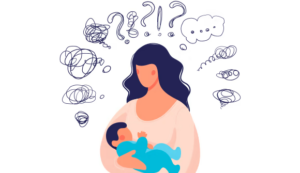It’s very natural to feel anxious from time to time, especially if you are faced with a stressful situation. However, excessive and persistent anxiety that is difficult to control and interfere with daily life may be a sign of generalized anxiety disorder. GAD is a very common type of anxiety disorder.
It is possible to develop GAD as a child or an adult. Generalized anxiety disorder’s symptoms are similar to those of panic disorder, obsessive-compulsive disorder, and other types of anxiety, but they’re all separate conditions.
There may be times when your worries don’t completely consume you, but you still feel a certain amount of anxiousness without any apparent reason. Worries can shift from one concern to another and may change over time. Living with generalized anxiety disorder can be a long-term challenge and in many cases, it occurs along with other anxiety or mood disorders. In most cases, a generalized anxiety disorder can be treated with psychotherapy or medications or in a few rare cases both. Making some lifestyle changes and using relaxation techniques also can help.
Symptoms of GAD:
Generalized anxiety disorder symptoms can vary from individual to individual and their severity may change over the course of time. But the typical symptoms are present for more than two months at a time. Symptoms of generalized anxiety disorder that can cause significant impairment to the individual may include:
- Persistent worry about a number of areas or things that are out of proportion to the impact of the events
- Overthinking any event or solutions to all possible worst-case outcomes
- Often perceiving situations and events as threatening, even when they aren’t
- Difficulty dealing with any sort of uncertainty or suspense
- Indecisiveness due to fear of making the wrong decision
- Inability to relax, and constantly feeling keyed up or on the edge
- Difficulty concentrating and often the feeling that your mind is “going blank”
- Fear or worry that you’re unable to explain or shrug off
The physical signs and symptoms of GAD might include:
- Fatigue
- Trouble falling asleep
- Muscle tension or muscle aches without any physical cause
- Trembling or feeling twitchy, often in hands and legs
- Sweating due to nervousness
- Nausea or irritable bowel syndrome
- Unexplainable anger or irritability
Cause of Generalized Anxiety Disorder:
As with many mental health conditions, the cause of generalized anxiety disorder likely arises from a complex interaction of biological and environmental factors, which may include:
- Differences in brain chemistry and function. Recent research indicates that changes in the function and effect of neurotransmitters and their interaction with neurocircuits can have a significant effect on a person’s personality. So, a chemical imbalance is likely to play a role in GAD.
- Personality. A person whose natural temperament is timid or negative or who avoids anything dangerous is more likely to be prone to generalized anxiety disorder than others are.
- Genetics. A generalized anxiety disorder may run in families but the researchers are yet to establish the actual genes that might be responsible.
- Experiences. Any sort of significant life-changing experience during childhood or adolescence may trigger generalized anxiety disorder. Chronic medical illnesses or any other sort of mental health disorders may increase the risk.
Other mental illnesses linked with GAD:
Generalized anxiety disorder often presents itself along with other mental health problems, which can make the diagnosis and treatment a bit more challenging. Some mental health disorders that commonly occur with a generalized anxiety disorder include:
- Phobias
- Panic disorder
- Post-traumatic stress disorder (PTSD)
- Obsessive-compulsive disorder (OCD)
- Depression
- Suicidal thoughts or suicide
- Substance abuse
Diagnosis and Treatment of Generalized Anxiety Disorder:
CBT is the most widely-used form of treatment for generalized anxiety disorder. It is a form of psychotherapy and involves meeting regularly to talk with a mental health professional. It is a short-term program that strives to help you become aware of inaccurate or negative thinking or behavior so that you can view challenging situations more clearly and respond to them in a more effective way. CBT has been successful in creating permanent change in many people with anxiety.
Medication
Medication is also prescribed along with therapy depending upon the severity of the problem. If your medical health professional recommends drugs, he/she is most likely to create a short-term medication plan initially and very rarely turn it into a long-term medication plan if need be. Anti-anxiety drugs shouldn’t be taken for long periods of time, as they have a high risk of dependence and abuse
Short-term medications relax some of the physical symptoms of anxiety, such as muscle tension, tremors, and stomach cramping. These are called anti-anxiety medications and some popular anti-anxiety medicines are Ativan and Xanax. Antidepressants can also be prescribed to certain people.
Lifestyle changes also known as anxiety relief techniques can be an effective way to relieve some of the stress and anxiety if incorporated into one’s life. These lifestyle changes are:
- Keep a journal. Writing down your emotions and keeping a track of your personal life can help you and your therapist identify what’s causing you stress and what seems to help you feel better.
- Prioritizing the issues in your life. You can reduce anxiety by not encountering unnecessary stressors and carefully managing your time and energy.
Avoid unhealthy substance use. Alcohol, drugs, and even nicotine or caffeine use can worsen your anxiety as they have mood-altering properties.
Feel free to reach out to us for counseling and psychotherapy sessions from our trained psychologists, and psychotherapists.




